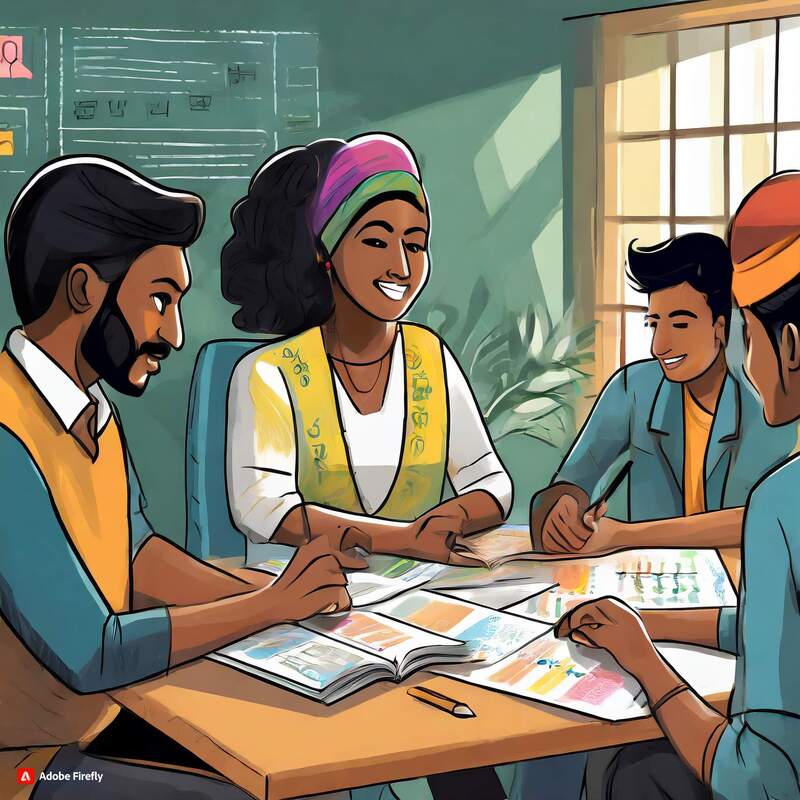In the sea of “Sameness”, Codewave stands out as a fearless rebel, challenging the age-old order of hierarchies, busting bureaucracy, dumping “command and control”, and putting more power in the hands of people. Codewave believes great Orgs are busy thriving on trust and common sense – tapping into the greatness of individuals. Codewave’s core values are – TRANSPARENCY, EMPATHY, AUTHENTICITY, TEAMPLAY & SELF MANAGEMENT; which are not just on our walls – but practiced actively in our everyday interactions.
Let’s delve deep into Self-management and its audacious potential to thrive without the crutch of traditional management, embodying the philosophy of “Be Your Own Boss” or BYOB.
1. AUTONOMY IN TEAM FORMATION:
If we have to make Self Management work at scale – we need to go back to basics and start with asking “How teams are formed?”. Do people have the autonomy to decide what projects they’ll be part of and who they’ll recruit to be a part of the project. At Codewave – new project opportunities are broadcasted broadly and openly, so everyone can volunteer and express interest in the kind of work they want to do. They can also choose a role they want to explore in their next project. Passion-led excellence is what matters no matter your title.
2. CLEAR BUT FLEXIBLE ROLES & RESPONSIBILITIES:
At Codewave, the project team comes together to kickoff the engagement with the client, starting with a “Vision” workshop. This ritual aligns everyone on the team to see the vision, client is seeing – which is critical in making their ideas a reality.
Roles are flexible at Codewave – while people have their pre-defined functions / roles they’ll play in the team, they’re free to dynamically assume responsibilities even outside of their roles, to act as cross-functional contributors. There’s no one telling anyone what they’ll do and what they won’t. Everyone is empowered to think creatively, ask critical questions and influence project outcomes – in the best interest of the product. Instead team members establish something called us “Social Contract”, where everyone participatively puts down the ground rules for the engagement, and the consequences for violating the rules. These rules are for general agreement on meeting times, frequencies, punctuality, attendance, modes of communication and escalation handling that this specific team would want from themselves. There could also be ‘behavioral’ rules such as – “Not interrupting while others are speaking”, “Not judging others” etc. Social contract can also have rules like “Everyone updates status before sprint plan meeting”, “Everyone speaks in meetings” etc. Consequences when one or more of the ground rules is breached – is also decided by the team.
Rewards & Penalties are set by the team – sometimes these are for the individual who breaches it, sometimes these are for everyone in the team irrespective of who breaches it. This keeps the team honest and helps each person in the team keep each other honest, no matter their seniority or title. Everyone is treated alike and faces consequences alike.
3. AGILE WAY OF LIFE & LOCAL DECISIONS:
A project runs pretty much like a “Football” game. In Football – though there are clear roles like the Forwards, Midfielders, Defenders, Goalkeepers, *Everyone* kicks the ball. There’s nobody including the captain telling who should kick and who shouldn’t. Everyone tracks where the ball is in realtime and takes independent decisions, to score maximum goals for the team.
At Codewave, we have empowered everyone to make local decisions, so there’s no need for centralized decision making (hierarchy & redtape). Anyone in the project team can take local decisions, using a checklist what we call the BOA (“Boundaries of Action”). This is a tool that guides people to take informed decisions, just like anyone in a position of accountability would.
Decisions like – How frequently to meet with client, Workmode, Sprint planning timing, Sprint demos, Milestone releases, Payment installments, Accepting new scope, Adding / removing team members, Design approvals, Tech stack, which library to use, WFO/WFH, Leaves etc are all managed at a project team level. Eventually as the team learns to make more complex decisions on their own, without any external guidance – the BOA is made more and more flexible, and less prescriptive. To take an example: If the team is able to take hiring decisions on their own, upto a certain spend limit – they can take call without involving any business team member. The spend limit will be increased as the team proves their abilities to take better decisions.
Sample BOA:
There’s radical transparency both with the teams and with our customers, every project – atleast once a week demos the progress to customers.
4. CONTINUOUS FEEDBACK & GROWTH CULTURE:
As the project is being executed, team members can give each other “anytime” feedback. This could be behavioral or technical. There are no protocols for when one should give performance feedback. The expectation is that you give feedback directly to the person 1-1, and seek acceptance. Our 5 Performance Parameters are: DEPENDABILITY, COMPETENCE, SELF MANAGEMENT, TEAMPLAY & IMPACT.
These parameters are a mix of measurable and non-measurable parameters, which encourages a combination of capabilities + character. It’s not “competent jerks” who win, but ones who earn the trust of their team & customers, and are highly dependable when things fall apart – who win. So, a high performer at Codewave is also a high performer in life and a great human being.
High performance individuals are generally self aware and self improving – they also seek out feedback at a sprint or milestone level – from both customers and team members. This peer feedback culture which encourages people to give and receive feedback, makes the team nimble and eliminates the need for a supervisor / manager to constantly nudge the team to do the right thing.
5. ACCOUNTABILITY TOWARDS PROJECT SUCCESS:
Every project from beginning to end, is continuously measured on 6 Key Performance Indicators – Revenue (cashflow), Profitability, Employee NPS (will they refer us?), Customer NPS (ambassadorship), Self management (byob score), Thought leadership (innovation). All project team members have access to these Project KPIs as it is important for people to make local decisions.
For example – everyone on the project team knows the profit margin on the project, to be able to take better decisions on whom to add, whom to remove to execute profitably. All team members also have access to the overall revenue and monthly cash-flow situation – so they can take informed decisions on when it’s critical to deliver milestones early. In short, when all project health information is available transparently and broadly to everyone on the team – it is a lot easier for team to empathize and take the best decisions, independently.
5. ACCOUNTABILITY TOWARDS ORG SUCCESS:
If every individual and every team in the Org is self-managed, then the Org is also self-managed, right? No. An Org can be self managed only when it’s KPIs & Success Criteria are continuously measured, retrospected and actioned. At Codewave – we have establish the same 6 Project KPIs at an Org level as well. Each Org level KPI has an initiative team – people join these initiative teams voluntarily, based on their interest. These KPI initiative teams are self managed as well, they set their goals / outcomes to be achieved every month / quarter and execute.
For example: If the customer NPS team has a goal of improving our cNPS scores from +60 to +80 by 3 months, they will take necessary steps in that direction. The cNPS initiative team will also ensure milestone level checkpoints with Customers, to ensure Customers are happy with the value they get, out of the engagement. Similarly other initiative teams like Revenue & Profit, track Org level revenue and profits, every month and take corrective actions. Codewave can truly be called a company that’s run by people, for people.








